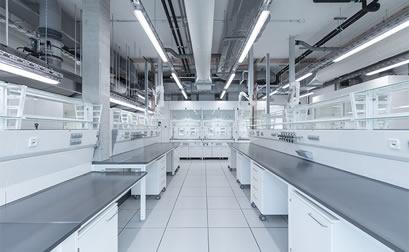R&D Laboratory
An R&D (Research and Development) laboratory is a specialized facility where scientific studies are conducted to produce innovative solutions, develop new products, improve existing products, and promote technological advancements. These laboratories play a critical role in the product development process and enable businesses to increase their competitiveness. In R&D laboratories, researchers and engineers carry out various experiments to turn theoretical knowledge into practical applications.
Types of R&D Laboratories
Product Development Laboratories
- Research conducted for the design of new products and the improvement of existing products.
- Prototype development and testing processes.
Analytical Research Laboratories
- Chemical, physical, and biological analyses of raw materials and finished products.
- Analysis of product formulations and components.
Application and Performance Testing Laboratories
- Testing products under real usage conditions and evaluating performance.
- Comparative analyses of different materials and product formulations.
Basic Research Laboratories
- Theoretical and applied research aimed at scientific discoveries and the development of new technologies.
- Exploration of new materials, chemical compounds, and biological processes.
Pilot Production Laboratories
- Small-scale production tests conducted prior to large-scale production.
- Testing the scalability of product production.
R&D Activities by Sectors
Food Industry
- New Product Development
- Development of healthy, organic, and functional foods.
- Research on alternative protein sources (plant-based proteins, insect-based proteins).
- Flavor and Aroma Research
- Development and improvement of natural and artificial flavors.
- Food Safety and Quality Control
- Microbiological tests and contamination analyses.
- Shelf-life determination and food durability testing.
- Packaging Technologies
- Development of environmentally friendly packaging materials that extend the shelf life of food.
Chemical Industry
- Development of New Chemical Compounds
- Design of polymers, catalysts, and industrial chemicals.
- Eco-Friendly Chemicals
- Development of biodegradable and non-toxic chemicals.
- Analytical Chemistry Research
- Purification of chemical components and development of chemical analysis methods.
Pharmaceutical Industry
- New Drug Molecule Research
- Discovery of new active ingredients for the treatment of diseases.
- Preclinical research on drug efficacy and safety.
- Formulation Development
- Development of new drug formulations and drug delivery systems.
- Clinical Research
- Evaluation of the effects of drugs on human health.
Dietary Supplement Production
- Vitamin and Mineral Development
- Development of new vitamins, minerals, and probiotics aimed at human health.
- Functional Dietary Supplements
- Research on products that boost the immune system or support metabolism.
Plant Extract Production R&D
- New Extraction Techniques
- Research on new techniques to maximize the extraction of active substances.
- Stabilization of Natural Compounds
- Development of stabilization methods that increase the shelf life of extracts.
Cosmetic Industry
- New Skin and Hair Care Products
- Development of skin and hair care products using natural and organic ingredients.
- Anti-Aging and Dermatological Products
- Research on innovative formulations targeting anti-aging and skin issues.
Construction Chemicals
- Concrete Additives
- Development of chemicals that increase the strength and durability of concrete.
- Heat and Water Insulation Materials
- Design of insulation products that enhance the energy efficiency of buildings.
Paint Industry
- Eco-Friendly Paints
- Development of low VOC, environmentally friendly paint formulations.
- Long-Lasting and Durable Paints
- Research on new paints with high durability and color retention features.
Textile Industry
- Textile Chemicals
- Development of special chemicals for fabric dyeing, softening, and water resistance.
- Functional Textile Products
- Anti-bacterial, UV-protected, and self-cleaning fabrics.
Automotive Industry
- New Material Research
- Development of lightweight, durable, and recyclable materials.
- Engine and Fuel Technologies
- New engine technologies that increase fuel efficiency and reduce emissions.
Petrochemical Industry
- New Polymer and Plastic Types
- Development of biodegradable plastics and alternative polymers.
- Fuel Improvement Techniques
- Development of alternative fuels and improvement of refined fuel quality.
Electronics
- New Battery Technologies
- Development of batteries with increased energy storage capacity and fast charging features.
- Advanced Sensor Technologies
- Research on high-sensitivity sensors for wearable devices and smart home products.
Health and Clinical Research
- Medical Device Development
- Development of next-generation diagnostic devices and medical equipment.
- Biomedical Research
- Genetic research, cell therapies, and biotechnological solutions.

